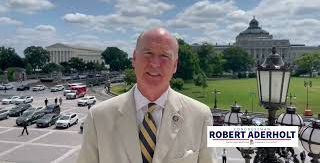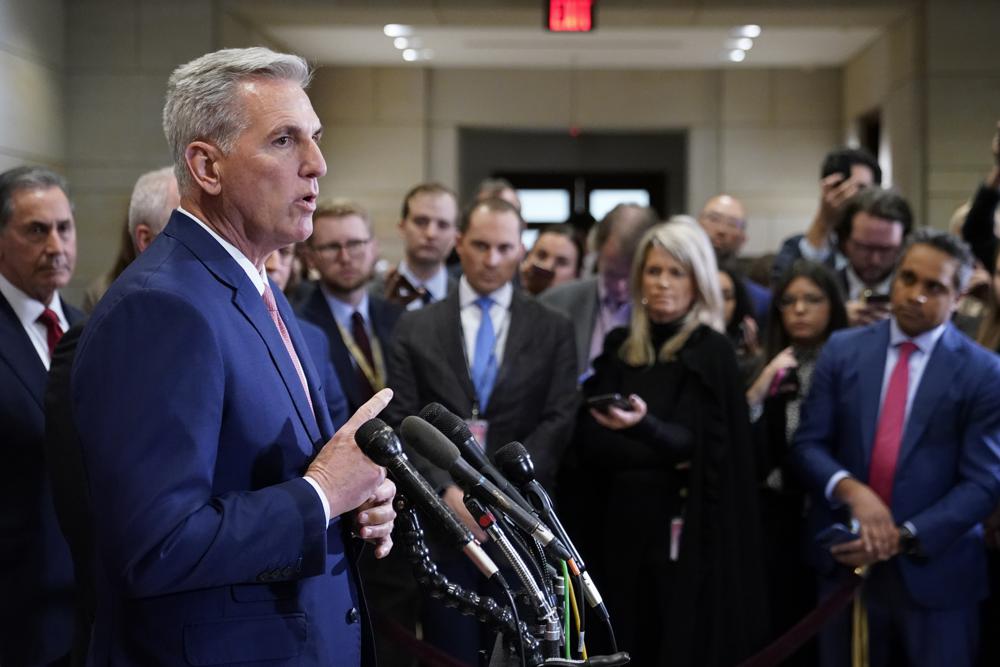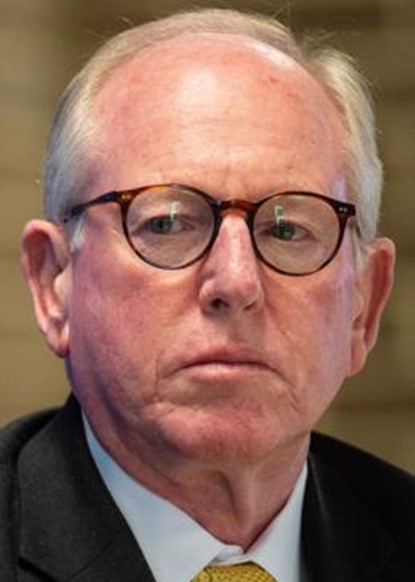Robert Aderholt expresses excitement over the successful Artemis 1 Launch

On Wednesday, Congressman Robert Aderholt released a statement following the successful Artemis I launch at Cape Canaveral, Florida, earlier on Wednesday morning. “I am beyond excited that Artemis I has taken to the sky,” Aderholt said. “This historic moment marks the beginning of a new era of human presence and permanence in space with the United States at the helm. I am sending my sincerest congratulations to the Artemis team, NASA, and everyone involved, especially our incredible workforce here in Alabama, in making this extraordinary feat possible.” On Twitter, Aderholt wrote, “Congratulations to everyone involved in the successful launch of @NASAArtemis. I particularly want to thank everyone @NASA_Marshall. This historic moment marks the beginning of a new era of human presence and permanence in space.” Artemis I is the first of several missions by NASA to send astronauts back to the Moon. The uncrewed mission will test the capabilities of the NASA Space Launch System and Lockheed Martin’s Orion capsule in delivering astronauts to lunar orbit. The Orion spacecraft will travel a total of 1.3 million miles around and past the Moon before its return to Earth on December 11, 2022. During Artemis I, the Orion spacecraft will journey 40,000 miles beyond the Moon before returning to Earth. Orion is equipped with cameras to collect valuable engineering data and show new perspectives of the Moon and the journey. There are 24 cameras on the spacecraft. Eight were on the SLS, and 16 are on Orion. The cameras document the liftoff, ascent, solar array deployment, external rocket inspections, landing and recovery, and capture images of Earth and the Moon. “Each of Orion’s four solar array wings has a commercial off-the-shelf camera mounted at the tip that has been highly modified for use in space, providing a view of the spacecraft exterior,” said David Melendrez, imagery integration lead for the Orion Program at NASA’s Johnson Space Center in Houston. The arrays can adjust their position relative to the rest of the spacecraft to optimize the collection of sunlight which is used to power Orion. This also allows the Mission Control Center flight controllers at NASA’s Johnson Space Flight Center to point the cameras at different parts of the spacecraft for inspections and to document the mission. If the Artemis I mission is successful, NASA hopes to launch a manned mission as early as 2024. NASA has plans for a permanent manned presence on the Moon, perhaps as early as 2028. The return to the Moon after 50 years of absence is being used to develop systems and processes for a manned mission to Mars slated for 2035. Thousands of Alabamians have worked on the SLS and Artemis missions through both NASA’s Marshall Space Flight Center in Huntsville as well as at NASA’s many contractors. Aderholt presently serves as the Ranking Member on the Appropriations Subcommittee on Commerce, Justice, and Science that funds NASA through the annual federal budget. Since Republicans gained control of the House in the recent midterm elections, Aderholt is likely to chair that subcommittee or even Appropriations as a whole – since the party that controls the House selects the Chairs of all the Committees. Aderholt was recently elected to his fourteenth term representing Alabama’s Fourth Congressional District. To connect with the author of this story, or to comment, email brandonmreporter@gmail.com.
Nancy Pelosi to step aside from Dem leadership, remain in Congress

House Speaker Nancy Pelosi said Thursday that she will not seek a leadership position in the new Congress, making way for a new generation to steer the party after Democrats lost control of the House to Republicans in the midterm elections. Pelosi announced in a spirited speech on the House floor that she will step aside after leading Democrats for nearly 20 years and in the aftermath of the brutal attack on her husband, Paul, last month in their San Francisco home. The California Democrat, who rose to become the nation’s only woman to wield the speaker’s gavel, said she would remain in Congress as the representative from San Francisco, a position she has held for 35 years when the new Congress convenes in January. “I will not seek reelection to Democratic leadership in the next Congress,” she said. “For me, the hour has come for a new generation to lead the Democratic caucus that I so deeply respect.” Now, she said, “we must move boldly into the future.” Pelosi received a standing ovation after her remarks, and lawmakers and guests, one by one, went up to offer her hugs, many taking selfies of a moment in history. President Joe Biden spoke with Pelosi in the morning and congratulated her on her historic tenure as speaker of the House. “History will note she is the most consequential Speaker of the House of Representatives in our history,” Biden said in a statement, noting her ability to win unity from her caucus and her “absolute dignity.” It’s an unusual choice for a party leader to stay on after withdrawing from congressional leadership, but Pelosi has long defied convention in pursuing power in Washington. In an interview with reporters after her announcement, Pelosi said she won’t endorse anyone in the race to succeed her, and she won’t sit on any committees as a rank-and-file lawmaker. She said the attack on her husband “made me think again about staying.” But in the end, after the election, she decided to step down. “I quite frankly, personally, have been ready to leave for a while,” she said. “Because there are things I want to do. I like to dance, I like to sing. There’s a life out there, right?” During her remarks on the House floor, Pelosi recapped her career, from seeing the Capitol the first time as a young girl with her father — a former congressman and mayor — to serving as speaker alongside U.S. presidents and doing “the people’s work.” “Every day, I am in awe of the majestic miracle that is American democracy,” she said. Democrats cheered Pelosi as she arrived in the chamber at noon. On short notice, lawmakers filled the House, at least on the Democratic side, and Senate Majority Leader Chuck Schumer joined. He later joined a throng of lawmakers and hugged and kissed Pelosi on the cheek. The Speaker’s Gallery filled with Pelosi staff and guests. Some Republicans, including some newly elected members, also attended, though House Republican Leader Kevin McCarthy, who’s seeking the speakership in the new Congress, did not, telling reporters afterward that he was “busy, unfortunately.” Earlier, Pelosi noted in a statement after The Associated Press called control of the chamber that, in the next Congress, House Democrats will have “strong leverage over a scant Republican majority.” Pelosi was twice elected to the speakership and has led Democrats through consequential moments, including the passage of the Affordable Care Act with President Barack Obama and the impeachments of President Donald Trump. Her decision Thursday paves the way for House Democratic leadership elections next month when Democrats reorganize as the minority party for the new Congress. Pelosi’s leadership team, with Majority Leader Steny Hoyer of Maryland and Democratic Whip James Clyburn of South Carolina, has long moved as a triumvirate. All now in their 80s, the three House Democratic leaders have faced restless colleagues eager for them to step aside and allow a new generation to take charge. Hoyer said after Pelosi’s remarks that “it is the time for a new generation of leaders” and that he will also step down from leadership but stay in Congress. Clyburn, the highest-ranking Black American in Congress, has said he expects to stay in Congress next year and hopes to remain at the leadership table. Democratic Reps. Hakeem Jeffries of New York, Katherine Clark of Massachusetts, and Pete Aguilar of California have similarly moved as a trio, all working toward becoming the next generation of leaders. Jeffries could make history if he enters the race to become the nation’s first Black speaker of the House. After Pelosi spoke, Clyburn released a statement saying he looks forward “to doing whatever I can to assist our new generation of Democratic Leaders, which I hope to be Hakeem Jeffries, Katherine Clark, and Pete Aguilar.” One idea circulating on Capitol Hill was that Pelosi and the others could emerge as emeritus leaders as they pass the baton to new Democrats. First elected in 1987, Pelosi has been a pivotal figure in American politics, long ridiculed by Republicans as a San Francisco liberal while steadily rising as a skilled legislator and fundraising powerhouse. Her own Democratic colleagues have intermittently appreciated but also feared her powerful brand of leadership. Pelosi first became speaker in 2007, saying she had cracked the “marble ceiling” after Democrats swept to power in the 2006 midterm elections in a backlash to then-President George W. Bush and the wars in Iraq and Afghanistan. When she was poised in 2018 to return as speaker in the Trump era, she vowed: “to show the power of the gavel.” Pelosi has repeatedly withstood leadership challenges over the years and had suggested in 2018 she would serve four more years as leader. But she had not discussed those plans more recently. Typically unsentimental, Pelosi let show a rare moment of emotion on the eve of the midterm elections as she held back tears discussing the grave assault on her husband of nearly 60 years. Paul Pelosi suffered a fractured skull after an intruder broke into their home
Personnel Update: Tracey Arnold named Chief of Staff for Alabama House Majority

On Thursday, Alabama House Majority Leader Scott Stadthagen announced that he has named Tracey Arnold as the Chief of the Staff of the Alabama House of Representatives Majority Caucus. Arnold is a twenty-year veteran of Alabama legislative operations. She will begin transitioning to her new role immediately. Arnold has served in Executive Assistant and Committee Clerk roles during her tenure in the Alabama State House. For the last five years, she has served as the Committee Clerk for the powerful House Rules Committee. “Tracey will be a great asset to the caucus and to each of our members, both newly elected and veteran legislators,” Stadthagen said in a statement shared via email with Alabama Today. “Her knowledge of the entire legislative process and of the needs of caucus members is unparalleled. Her institutional knowledge, work ethic, and commitment to doing everything she does with accuracy and integrity will serve the members and the taxpayers well.” Arnold is a native of Montgomery and a graduate of Faulkner University. She said that she is excited about her new role. “This is going to be a new challenge, but it is one I am looking forward to,” Arnold said. “Working with the Majority Leader to serve the entire caucus and, effectively, the entire state is an honor,” Arnold said. “I am ready to roll up my sleeves and get to work.” The Alabama House of Representatives will be led by a new leadership team. Stadthagen was elected by the House Republican Caucus to serve as Majority Leader on November 10. State Rep. Nathaniel Ledbetter, the previous Majority Leader, was elected to be the next Speaker of the House. Speaker Mac McCutcheon did not run again. The House Republican Caucus elected Chris Pringle as Speaker Pro Tem. The current Pro Tem – Victor Gaston – also did not run for re-election. Pringle was recently re-elected to his second term in the Alabama House of Representatives. Republicans successfully defended their commanding supermajorities in both Houses of the Alabama Legislature during recent midterm elections. To connect with the author of this story, or to comment, email brandonmreporter@gmail.com.
Personnel Update: Drew Harrell to serve as Kay Ivey’s Director of Legislative Affairs

On Thursday, Alabama Governor Kay Ivey announced that she is appointing Drew Harrell as director of legislative affairs. “Alabama has some major items to tackle, which will require a bold legislative agenda from my Administration over the next four years, and Drew is the right man to help me accomplish our goals,” Ivey said in an emailed statement shared with Alabama Today. “I am proud to have Drew join our team as we work to ensure Alabama’s best days are yet to come,” said Governor Ivey. “Drew cares deeply for our state, is an incredibly hard worker, and a great family man. We will certainly miss having William, but sure are proud of him as he brings his skills to his alma mater, and we are thrilled to be adding Drew to the Ivey Administration.” Ivey was recently overwhelmingly re-elected Governor Ivey to a second term. The governor’s current director of legislative affairs, William Filmore, is leaving the Administration to serve his alma mater, Troy University, leading their governmental affairs team. Harrell comes from the powerful Business Council of Alabama (BCA), where he is most recently the vice president of governmental affairs. He also served as the executive director of the organization’s political action committee, ProgressPAC. Harrell has held a variety of responsibilities at BCA and was a key figure in advancing the group’s policy for the state of Alabama, including the controversial 2019 Rebuild Alabama Act, which raised fuel taxes on the people of Alabama to fund road projects. That initiative was championed by Gov. Ivey. “I am deeply honored to be joining Governor Ivey’s Administration and thankful to her for the opportunity to serve as director of legislative affairs,” said Harrell. “I am excited about helping Governor Ivey advance policies that will move Alabama ahead. I am grateful for the years I have spent at BCA, which have more than prepared me for this new challenge.” Harrell is a former athlete, lettering in football and baseball at Huntingdon College, where he earned a bachelor’s degree. Harrell has a Master of Business Administration from Auburn University. He serves as vice president of Huntingdon College’s National Alumni Board of Directors. Filmore will continue serving in the Ivey Administration through the end of November. “Working for Governor Kay Ivey has been the honor of a lifetime,” Fillmore stated. “She is a proven leader who works as hard as anyone in Montgomery. Governor Ivey personally cares about Alabama’s citizens and our future, which is why – through her strong relationship with the Legislature – she has succeeded in improving our infrastructure, education, mental health care, economic development, and broadband, among many other accomplishments. I am confident our state will continue to prosper, and more progress will be made through the leadership of Governor Ivey and her team in the next four years.” Harrell joins Parker Harris and Michele Brown in the Legislative Affairs Office beginning December 1. Ivey still has to fill the senate liaison role, which was made vacated when Brooks McClendon was promoted to serve as Ivey’s deputy chief of staff. To connect with the author of this story, or to comment, email brandonmreporter@gmail.com.
Federal dollars to address Alabama’s abandoned mines

Alabama is receiving an infusion of federal funds to address abandoned mine lands. Through the Infrastructure Investment and Jobs Act, President Joe Biden said Alabama is poised to receive $20,450,847 in federal funding that is to be used to create good-paying union jobs in an effort to catalyze economic opportunity in the state by reclaiming abandoned coal mines. The funding would be used to clean up hazardous sites, according to the release, while at the same time address environmental injustices in the state. Department of the Interior Secretary Deb Haaland, in a release, said it is an investment to clean up environmental hazards that are harming communities. “Reclaiming and restoring these sites will create jobs, revitalize economic activity, and advance outdoor recreation,” she said. “I am so excited about what we can do with these new resources today and for future generations.” According to the release, millions of Americans live just 1 mile from an abandoned coal mine or orphaned oil or gas well. The law provided $11.3 billion over a span of 15 years to address the issue. Abandoned Mine Lands reclamation, according to the release, sustains jobs in coal communities through investments in projects that close dangerous mine shafts, reclaim unstable slopes, improve water quality through treatment of acid mine drainage, and also restores water supplies that were damaged through mining. Reclaims lands, according to the release, are then used for recreational facilities or economic revitalization. Federal dollars under the plan will be prioritized to projects that employ dislocated coal miners. Republished with the permission of The Center Square.
GOP wins slim House majority, complicating ambitious agenda

Republicans won control of the U.S. House on Wednesday, returning the party to power in Washington and giving conservatives leverage to blunt President Joe Biden’s agenda and spur a flurry of investigations. But a threadbare majority will pose immediate challenges for GOP leaders and complicate the party’s ability to govern. More than a week after Election Day, Republicans secured the 218th seat needed to flip the House from Democratic control. The full scope of the party’s majority may not be clear for several more days — or weeks — as votes in competitive races are still being counted. But they are on track to cobble together what could be the party’s narrowest majority of the 21st century, rivaling 2001, when Republicans had just a nine-seat majority, 221-212, with two independents. That’s far short of the sweeping victory the GOP predicted going into this year’s midterm elections, when the party hoped to reset the agenda on Capitol Hill by capitalizing on economic challenges and Biden’s lagging popularity. Instead, Democrats showed surprising resilience, holding on to moderate, suburban districts from Virginia to Minnesota and Kansas. The results could complicate House GOP leader Kevin McCarthy’s plans to become speaker as some conservative members have questioned whether to back him or have imposed conditions for their support. McCarthy celebrated his party having “officially flipped” the House on Twitter on Wednesday night, writing, “Americans are ready for a new direction, and House Republicans are ready to deliver.” Biden congratulated McCarthy, saying he is “ready to work with House Republicans to deliver results for working families.” “Last week’s elections demonstrated the strength and resilience of American democracy. There was a strong rejection of election deniers, political violence, and intimidation,” Biden said in a statement. “There was an emphatic statement that, in America, the will of the people prevails.” He added that “the future is too promising to be trapped in political warfare.” The narrow margins have upended Republican politics and prompted finger-pointing about what went wrong. Some in the GOP have blamed Donald Trump for the worse-than-expected outcome. The former president, who announced his third White House bid Tuesday, lifted candidates during this year’s Republican primaries who often questioned the results of the 2020 election or downplayed the mob attack on the U.S. Capitol last year. Many of those struggled to win during the general election. Despite the GOP’s underwhelming showing, the party will still have notable power. Republicans will take control of key committees, giving them the ability to shape legislation and launch probes of Biden, his family, and his administration. There’s particular interest in investigating the overseas business dealings of the president’s son Hunter Biden. Some of the most conservative lawmakers have raised the prospect of impeaching Biden, though that will be much harder for the party to accomplish with a tight majority. Any legislation that emerges from the House could face steep odds in the Senate, where Democrats won the barest of majorities Saturday. Both parties are looking to a December 6 Senate runoff in Georgia as a last chance to pad their ranks. With such a potentially slim House majority, there’s also potential for legislative chaos. The dynamic essentially gives an individual member enormous sway over shaping what happens in the chamber. That could lead to particularly tricky circumstances for GOP leaders as they try to win support for must-pass measures that keep the government funded or raise the debt ceiling. The GOP’s failure to notch more wins — they needed a net gain of five seats to take the majority — was especially surprising because the party went into the election benefiting from congressional maps that were redrawn by Republican legislatures. History was also on the Republicans’ side: The party that holds the White House had lost congressional seats during virtually every new president’s first midterm of the modern era. The new majority will usher in a new group of leaders in Washington. If elected to succeed House Speaker Nancy Pelosi in the top post, McCarthy would lead what will likely be a rowdy conference of House Republicans, most of whom are aligned with Trump’s bare-knuckle brand of politics. Many Republicans in the incoming Congress rejected the results of the 2020 presidential election, even though claims of widespread fraud were refuted by courts, elections officials, and Trump’s own attorney general. McCarthy won the nomination for House speaker on Tuesday, with a formal vote to come when the new Congress convenes in January. “I’m proud to announce the era of one-party Democrat rule in Washington is over,” McCarthy said after winning the nomination. Republican candidates pledged on the campaign trail to cut taxes and tighten border security. GOP lawmakers also could withhold aid to Ukraine as it fights a war with Russia or use the threat of defaulting on the nation’s debt as leverage to extract cuts from social spending and entitlements — though all such pursuits will be tougher given how small the GOP majority may end up being. As a senator and then vice president, Biden spent a career crafting legislative compromises with Republicans. But as president, he was clear about what he viewed as the threats posed by the current Republican Party. Biden said the midterms show voters want Democrats and Republicans to find ways to cooperate and govern in a bipartisan manner, but also noted that Republicans didn’t achieve the electoral surge they’d been betting on and vowed, “I’m not going to change anything in any fundamental way.” AP VoteCast, a broad survey of the national electorate, showed that high inflation and concerns about the fragility of democracy had heavily influenced voters. Half of voters said inflation factored significantly, with groceries, gasoline, housing, food, and other costs that have shot up in the past year. Slightly fewer — 44% — said the future of democracy was their primary consideration. Counter to the GOP’s expectations, Biden didn’t entirely shoulder the blame for inflation, with close to half of voters saying the higher-than-usual prices were more because of factors outside his control. And despite the president bearing criticism from a pessimistic electorate, some of those voters backed
Britt calls incoming freshman of GOP Senators “the kind of fresh blood needed”

Senator-elect Katie Britt released a statement praising the group of freshmen Republican Senators entering the U.S. Senate following the Senate Republican Caucus’s meeting and leadership elections on Wednesday. “Our incoming freshman class of Republican senators represents the kind of fresh blood needed to help get our country back on the right track, and I’m going to bring that perspective to our caucus every single day,” Britt said in a statement. “I believe that having this spirited internal debate on how we can best fight to put American families first and defend our conservative values is good for our party and good for our country. Now, it’s time to move forward together as a united front determined to do everything in our power to stop President [Joe] Biden and his congressional allies from crushing hardworking Alabamians and Americans even further. The first step, and where our full focus must be, is helping Herschel Walker win in Georgia.” The GOP Senate Caucus voted during the meeting to keep Sen. Mitch McConnell as the Senate Minority Leader. McConnell beat back a challenge from Sen. Rick Scott, who headed the National Republican Senatorial Committee (NRSC) during the recent midterm elections. Senate Republicans are still shocked by their poor performance in the midterm elections that many pollsters had reported would go their way. The GOP lost close Senate elections in Pennsylvania, Arizona, and Nevada that would have flipped control of the Senate to Republicans. Scott criticized McConnell for failure to articulate a Republican message prior to the election. Sens. Tom Cotton and John Barrasso nominated McConnell, while Sen. Ron Johnson nominated Scott. “Every one of our candidates knew what they were for, expressed it quite clearly,” McConnell said. “It’s pretty obvious, and all of you have been writing about it, what happened. We underperformed among independents and moderates because their impression of many of the people in our party in leadership roles is that they’re involved in chaos, negativity, excessive attacks, and it frightened independent and moderate Republican voters.” Some observers believed that McConnell was making a veiled reference to former President Donald Trump, who announced Tuesday night that he was once again running for the Republican nomination for President in the 2024 election. Two McConnell-controlled outside groups, One Nation and the Republican Leadership fund spent $363 million on the midterm elections – significantly more than Scott and the NRSC. McConnell won reelection as Senate GOP leader 37 to 10, with one member abstaining. Republican nominee for Senate Herschel Walker is in a December 6 runoff election with incumbent Sen. Raphael Warnock. Despite the disappointing Senate performance, Republicans did win control of the U.S. House of Representatives. This means that Kevin McCarthy will likely replace Nancy Pelosi as Speaker of the House. Britt defeated Democratic nominee Dr. Will Boyd and Libertarian John Sophocleus a week ago in the general election on November 8 to win the open Senate seat. Clay Armentrout and Sean Ross are heading Britt’s transition team. To connect with the author of this story, or to comment, email brandonmreporter@gmail.com.
Mayor Tab Bowling offers Airbnb despite city rental ban

An Alabama mayor said he will have to “man up” and deal with the blowback after a newspaper reported he was operating an Airbnb at his home despite a city ordinance that prohibits such short-term rentals. Decatur Mayor Tab Bowling told the Decatur Daily he might need to stop offering a small guesthouse for rent following its reporting. “Obviously, this will end up being embarrassing,” Bowling told the newspaper Tuesday. “… It’s not something I look forward to dealing with in the media. I’m not looking forward to that. But I’m looking forward to the ordinance being changed so that we can do this.” A Decatur ordinance prohibits Airbnbs and other short-term rentals except in certain parts of the city, but Bowling has been offering a small house on his property for rent for as little as $70 a night since at least August, the newspaper reported. In September, after Bowling began renting out the guesthouse and as the council was discussing the possibility of relaxing the ban on short-term rentals, Bowling told the newspaper that many other people were renting houses for short stays despite the ban. “It’s definitely something we need to address for our city because it’s being done. It’s almost like bootlegging before the city was wet,” Bowling said. Bowling said he may need to stop renting the guesthouse until the issue is resolved. “This (publicity) is probably not going to be met with a lot of favor. I’ll just have to man up and deal with it,” said Bowling, who was first elected in 2016 and won a second term two years ago. City leaders were critical of Bowling’s actions. “That was just dumb,” said council member Carlton McMasters. “We’re elected, and we take an oath to uphold our laws and ordinances, and that wasn’t done. We try to be transparent in decision-making, and I hope this doesn’t cause distrust.” Republished with the permission of The Associated Press.
Arizona company Solar Inc. adds $1 billion solar power parts plant in Alabama

Arizona-based First Solar Inc. has selected Alabama as the site of a more than $1 billion factory that will manufacture modules that generate solar power, the company announced Wednesday. First Solar said in a statement that the plant, to be located in Lawrence County in the Tennessee Valley region, will create more than 700 jobs. The factory is part of a previously announced plan to increase First Solar’s U.S. manufacturing capacity to more than 10 gigawatts by 2025, the company said. It already has three factories in Ohio, one of which is expected to begin production next year. First Solar describes itself as the only major solar manufacturer that has headquarters in the United States and is not making components in China. The project will bring the company’s total investment in U.S. manufacturing to more than $4 billion, it said. A bill signed by President Joe Biden in August will direct spending, tax credits, and loans to bolster technology like solar panels; consumer efforts to improve home energy efficiency; emissions-reducing equipment for coal- and gas-powered power plants; and air pollution controls for farms, ports, and low-income communities. First Solar CEO Mark Widmar said that legislation “has firmly placed America on the path to a sustainable energy future,” and the new plants will help with the transition toward cleaner energy, which supporters say will help stem climate change. Republished with the permission of The Associated Press.


